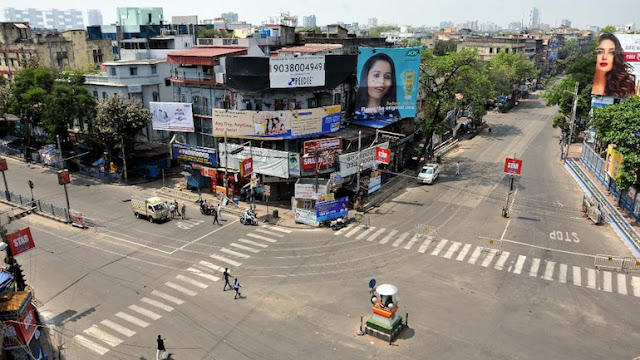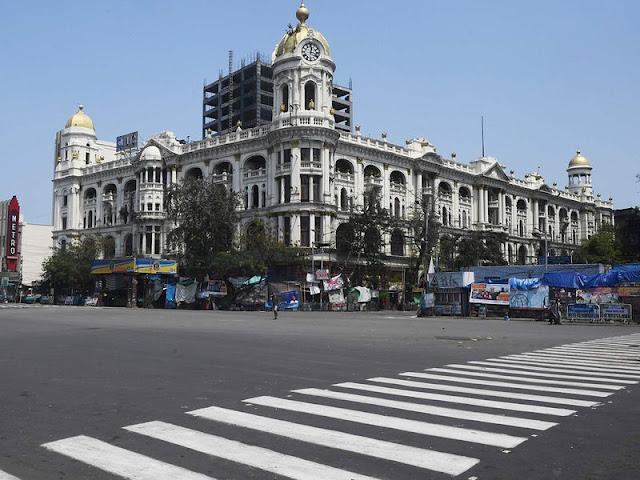 |
A large section of the business community thinks that it will take the whole of the 2020-21 financial year for business transactions to be completely normal in Kolkata after the lockdown is lifted due to the huge money laundering.
The first phase of Lockdown has been launched across the country, including Kolkata, since March 25, 2020 to prevent the spread of the deadly coronavirus. All business has been closed for the last six months except for essential goods and services. As a result, business in the roadside, retail, and wholesale markets of greater Kolkata has suffered huge losses.
There are about 34 lakh small and large shops in and around Kolkata, which have been closed since March 25. As 34 lakh shops were closed in Kolkata for lockdown in the last six months, there was no business transaction of 20 lakh 40 thousand crores.
As 34 lakh shops are closed in Kolkata, more than 20 million people have been sitting for the last six months. A large part of them is people below the poverty line like labourers, vans, wheelbarrows. They have been in a very bad situation in the last few months. A large portion of the roadside workers is in danger of losing their jobs as the lockdown brings businesses to a complete standstill.
 |
| Esplanade Junction in lockdown. Image via: Agence France-Presse |
About 80 per cent of Kolkata's electronics market is dependent on China due to global coronavirus. Since the roads in China have been closed since last February, not even coming from China starting from toys, mobiles, chargers, headphones, television sets, computers to bulbs, etc. Chandni Chowk is the largest market for electrical goods in Kolkata. Corona put its paw there too.
Business there is also largely dependent on China. The situation was even worse at various shops on Ezra Street. The lighting business there runs directly on materials brought from China. As a result of the novel coronavirus, electronics markets like Chandni Chowk and Khidirpur in Kolkata were gradually emptied. More than one crore people make a living in West Bengal by relying on Chinese electronics. After their livelihood became dark today.
During the lockdown, only 10% of hawkers selling fruits, vegetables, and groceries were ready to do business. quite 80% of hawkers weren't ready to open their makeshift shops. Viewed from the national perspective about 60% of hawkers depend upon their daily earning. At that time of this situation, hawkers are using their business capital to sustain their families.
Two hawkers in Kolkata had even committed suicide. If people don't begin and lockdown isn't completely over then things won't improve. 2 crores are food hawkers and in Kolkata, there are a minimum of 1.40 lakh food hawkers. those hawkers selling food are in terrible condition. If things don't improve hawkers may take the trail of suicide.
Nearly 30% of the businesses lay off employees within the lockdown. Around 70% of Kolkata’s start-ups are adversely impacted by COVID-19, and 12% have closed down operations since the outbreak, consistent with a nationwide survey. As per the survey findings, only 22% of the start-ups have cash reserves to satisfy the fixed charge expenses of their companies over the subsequent three to 6 months. Additionally, 68% of the start-ups are lowering their operational and administrative expenses.
As many as 96% of the investors stated that the investment in start-ups has been impacted by COVID-19, and 92% of the investors maintained that the start-up investments will still below over the subsequent six months. Lack of capital and cash flows may cause major lay-offs by start-ups over the subsequent three to 6 months. The survey indicates that the Indian start-ups need an enabling ecosystem and flow of
funds to continue operations. The survey results also clearly indicate that the start-ups are struggling during this unprecedented time in our history. To navigate the evolving situation, start-ups must specialize in cash preservation so sufficient capital is out there to last out the crisis. Start-ups must use their strengths in innovation to re-strategize and re-think their business.
Turni Dhar, Debayan Datta and Swarnaditya Das — three friends who, when the lockdown was imposed in late March and their workplaces were shut, decided to stay themselves busy by turning Good Samaritans. While they need to be generous with help during the lockdown, nobody helps them when their incomes have dry out. so that they have decided to show their charity work into a business. Last week, they found out a corporation called 'Dependablez'. Their move is additionally a mirrored image of the changing nature of ventures within the new normal.
Many fortunate are at that time invested their reserves for switching to businesses that were in demand during the lockdown, like selling essential items and masks. Others who didn't have much savings had to borrow from family and friends to start out selling fish and vegetables. Like, one 55-year-old man did not have any plans of converting his business in 2020 but the lockdown dried up his income from his jewelry store, forcing him to sell groceries, potato, and egg from his outlet in Bagbazaar in north Kolkata.
A 40-year-old man in his shop in Bagri Market, when the lockdown came into effect the businessman immediately shifted gears, making masks and sanitizers to keep his family afloat. A cab driver rented a van rickshaw and started selling bread in the morning and vegetables in the evening. A couple more converted their garments shop to the grocery store. The pandemic and the shock to the economy also forced many people to learn on the job to adapt to their new vocations, also pulled many people out of their comfort zone, and hurled them at the deep end of the pool. It also keeps many peoples busy and they have acquired a new skill.
Ashutosh Pal, a gold trader, said, "At the beginning of the lockdown, it was very difficult to run the expenses, the income was stopped, the expenses had to be run from the money saved. The first few months were not working. But as soon as the lockdown over, I started going to the shop. Since I went there, my income in business started to be more than before the lockdown. This is because after the lockdown when everything slowly starts to return to normal, people already don’t have the money, all the money saved in the lockdown has been spent, so people will now sell their property to cover the cost. This has led to an increase in their tendency to sell gold jewelry, which is making more profit in many parts of my business than lockdown before."
Souvik Paul

Post a Comment